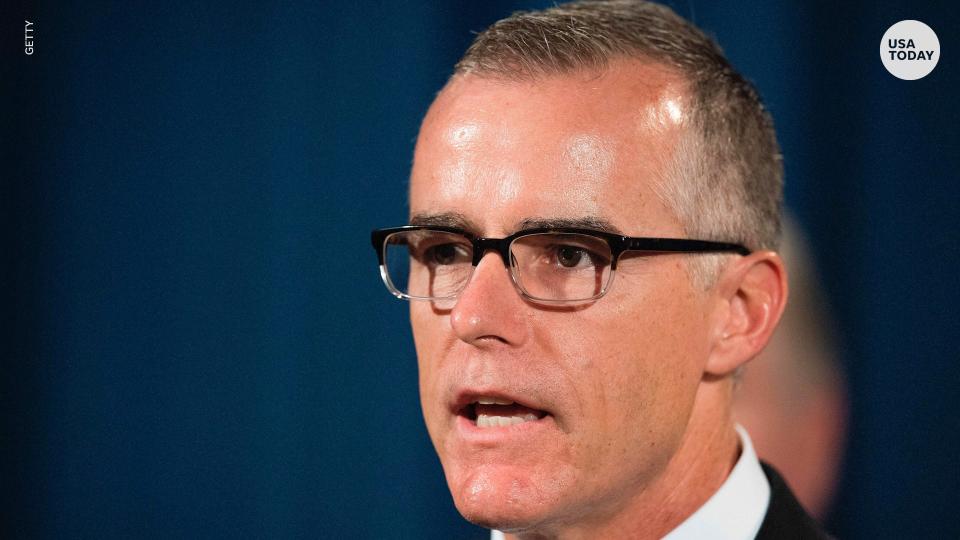Ex-deputy FBI chief McCabe: Officials had reason to think Trump posed 'danger to national security'
- Oops!Something went wrong.Please try again later.
- Oops!Something went wrong.Please try again later.
Former FBI deputy director Andrew McCabe Tuesday defended the bureau's investigation into the Trump campaign's ties to Russia, claiming that political bias played no role in an inquiry that shadowed much of President Donald Trump's administration.
"We didn’t open a case because we liked one candidate or didn’t like the other one," McCabe told a Senate panel. "We didn’t open a case because we intended to stage a coup or overthrow the government... We opened a case to find out how the Russians might be undermining our elections. We opened a case because it was our obligation – our duty – to do so. We did our job."
McCabe told lawmakers that as the inquiry went on federal investigators became "alarmed" at Trump's multiple interactions with then-Director James Comey, urging the FBI to drop an investigation into former national security adviser Michael Flynn's contacts with a Russian ambassador. When Trump later fired Comey, citing his management of the Russia investigation, authorities feared the president was actively seeking to obstruct the inquiry.

At that point, McCabe said investigators had reason to think that Trump "posed a danger to national security."
Andrew McCabe: Former FBI deputy director, won't face criminal charges
McCabe, who served as the bureau's acting director after Trump fired then-FBI Director James Comey for his role in managing the Russia inquiry in 2017, is the fourth witness to be called before the Senate Judiciary Committee's investigation into the Russia inquiry. On the eve of his scheduled retirement in 2018, McCabe was dismissed related to allegations that he misled investigators about information provided to the media. He is challenging the dismissal.
So far, the Republican-controlled panel has heard from Comey, former Trump Deputy Attorney General Rod Rosenstein and former Obama Deputy Attorney General Sally Yates.
All three have defended the legitimacy of the inquiry.
'I'm accountable': Ex-deputy AG Rod Rosenstein defends oversight of Russia probe but accepts flaws in FBI surveillance
'No such thing happened': Former acting AG Sally Yates says Obama, Biden did not urge Flynn inquiry
Led by Chairman Lindsey Graham, R-S.C., the Republican members have cast the Russia investigation as a politically motivated operation to undermine candidate Trump and later the Trump presidency.
The committee's review builds on a separate investigation by the Justice Department's inspector general, which last year determined that the FBI's requests for surveillance of former Trump campaign aide Carter Page was riddled with errors.
Although the inspector general was highly critical of the FBI's actions in seeking the Page surveillance, the review found that political bias played no role in launching the investigation.
More: Former FBI Director James Comey defends Russia investigation, concedes on Carter Page
McCabe acknowledged those errors Tuesday, saying that he would not have approved of the surveillance warrant for Page had he known about the errant document.
"I was shocked and disappointed at the errors and mistakes that the (inspector general) found," McCabe said. "To me, any material misrepresentation or error in a (wiretap) application is unacceptable. Period."

"Who is responsible for ruining Carter Page's life?" Graham asked McCabe who appeared by video.
"We are all responsible for the work that went into that (warrant)," McCabe said. "I accept that responsibility."
The Justice Department's inspector general's findings led to the prosecution of a former FBI lawyer who pleaded guilty earlier this year to falsifying an email used to support the surveillance request. Federal authorities also used an unverified dossier, purporting to chronicle Trump's past activities in Moscow, to support the warrant application.
When the FBI obtained the dossier in September 2016, compiled by a former British intelligence agent Christopher Steele, Comey told lawmakers he was unaware Steele's primary source was a suspected Russian agent.
Graham and other Republican members have asserted that the abuses uncovered by the inspector general have "shaken" confidence in the system.
Sen. John Cornyn, R-Texas, Tuesday characterized the FBI's work on the case as an agency characterized the FBI's pursuit of Page as an agency "gone rogue."
"We need to make sure that nothing like this ever happens again," Cornyn said.
Democrats, meanwhile, noted that the hearing was a re-hashing of events that have been examined at length by the Justice inspector general and by Russia special counsel Robert Mueller.
"Enough!" Sen. Richard Durbin, D-Ill., said.
This article originally appeared on USA TODAY: Andrew McCabe: Reason to think Trump posed national security 'danger'

